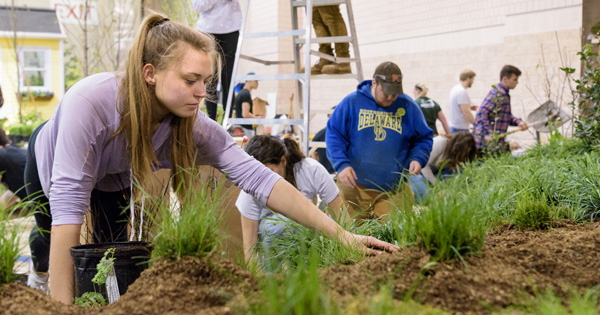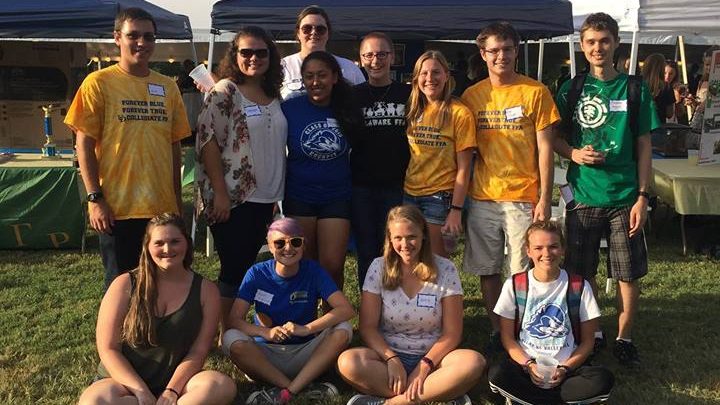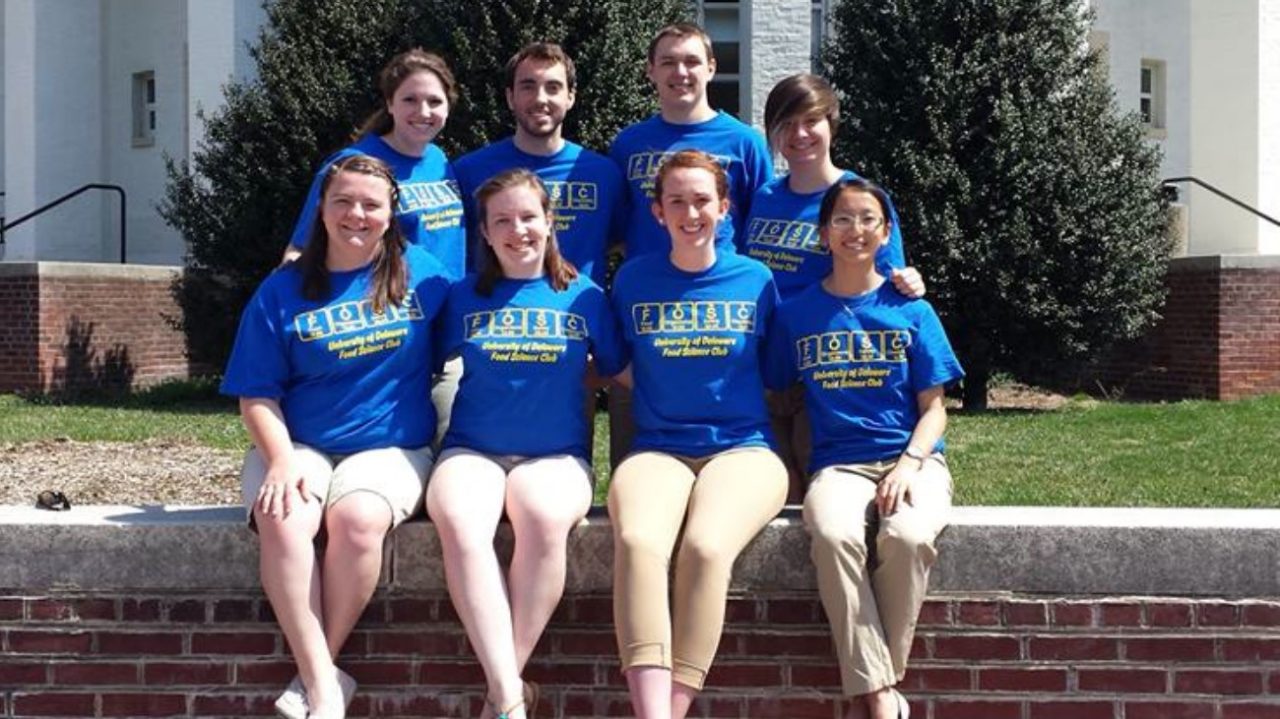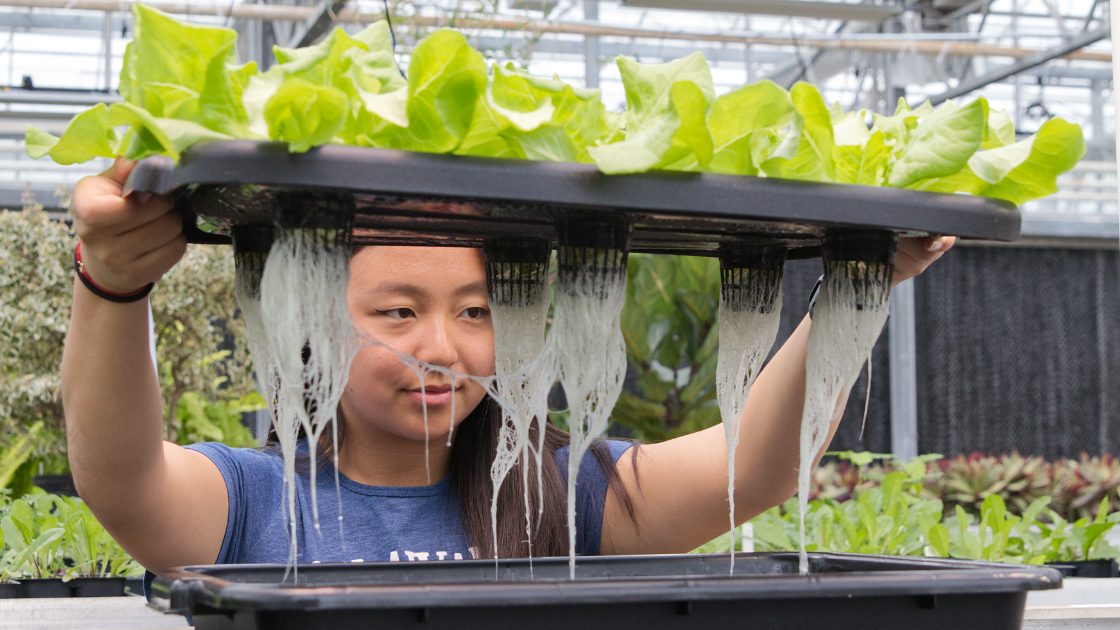
Sustainable Food Systems major
Major in sustainable food systems at the University of Delaware: youtube.com/watch?v=QQEgnAlXgdA
Do you want to become a leader in improving the sustainability of food systems in our community and across the globe? Sustainable Food Systems (SFDS) will train you to approach key food system challenges critically and innovatively—from agriculture and production, processing, retail consumption and waste. Sustainable food businesses, nonprofits and policymakers need more thinkers, strategists, planners and activists to help lead the population in utilizing, yet preserving our precious natural resources.
Uniqueness of our program
Classroom theory meets practical application in our distinctive 350-acre classroom—a live laboratory with state-of-the-art greenhouses, gardens and research labs. SFDS majors gain practical experience in a diverse atmosphere. Our resources are second-to-none, including a U.S. Department of Agriculture certified organic vegetable operation, greenhouse with hydroponics and a farmbot, controlled environment growth chamber facilities, research laboratories, food production facilities, hop production yard, botanic gardens and ecology woods. Many other on-campus laboratories host undergraduate research opportunities, including Delaware Biotechnology Institute and the Harker Interdisciplinary Science and Engineering Laboratory. Delaware Cooperative Extension also offers opportunities in programs like 4-H youth development, lawn and garden, and family and consumer sciences. Students may also take part in internships and other experiential learning activities at the Carvel Research and Education Center, which spans 467 acres in Sussex County.
Our curriculum
Our curriculum emphasizes the fundamentals of plant, soil, food, social and animal sciences, including basic chemical and mathematical principles, to the food system. Our overall goal is to provide food, feed and fiber in ways that are profitable, with considerations of food equity, while protecting the environment and preserving natural resources. At the forefront of this curriculum, we solve problems of agricultural production systems and critically evaluate these food systems in relation to their economic, environmental and social justice. You will learn the fundamentals of agronomy and related agricultural sciences required for sustainable food production and food security. Finally, you will apply your food systems knowledge in an experiential internship.
This sample shows just one possible pathway to earning a bachelor of science degree in Sustainable Food Systems in four years. This plan does not replace the advice of your advisor.
Course highlights
Instructors cover fundamentals of soils with respect to sustainable land management. This introduction to basic soil properties includes the role of soils in society, agriculture, landscape design and planning and environmental issues. Students discuss measures to promote the preservation, health and restoration of soil resources.
Students are introduced to agricultural biotechnology and socio-economic issues. Instructors cover genetic engineering and the basic scientific theory and the applications of biotechnology in agriculture production and research. Students discuss issues surrounding biotechnology-risk and technology assessment, animal rights, public and private research interface, media and environmental perspectives, consumer acceptance, regulation and economic development.
This course strengthens students’ foundation on the water cycle, soil development, energy and food production, and links these separate areas in a systems-based approach toward sustainability. Major topics covered include water use, pollution, and reclamation; soil development, erosion, pollution, salinization and remediation; food security, food safety, local food production and consumption, food packaging, global food production and consumption, GMOs; food waste and composting; energy needs, climate change and mitigation and feedbacks on the food system.
Students discuss management and ecology of the major U.S. agronomic crops. The coursework emphasizes management decisions and the conceptual basis for these decisions. Crop growth and development are discussed as they pertain to decision making and troubleshooting. This applied course discusses the decisions a grower must address in the production of an agronomic crop.
Instructors address the interactions between organisms and their environment as an integrated system, and involves the study of energy and material flows through ecosystems. Students study how science of ecosystem ecology is relevant for understanding components of the Earth system (atmosphere, climate and geological systems).
Students apply ecological principles to urban ecosystems, focusing on the intersection of biophysical and social drivers in controlling urban ecosystem structure and function. Cities, the most human-dominated ecosystem, are integral for studying ecological consequences of many global environmental change factors like habitat fragmentation, invasive species introductions, climate change and water and air pollution. The course culminates in an examination of urban green infrastructure, urban resilience, adaptation and sustainability.
Related student organizations

APPLY NOW
Associate Director, CANR Undergraduate Recruitment



